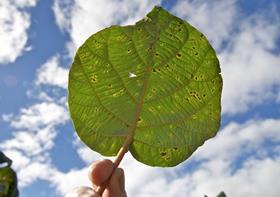
A new Plant & Food Research project into the Psa disease may help future-proof the kiwifruit industry.
The project, led by Jay Jayaraman, received a Fast Start Marsden grant and will investigate the plant pathogen Psa (Pseudomonas syringae pv actinidiae), to understand how it evolves during infection of the kiwifruit plant.
Psa caused severe damage to New Zealand’s kiwifruit crops after its discovery in 2010. While the industry recovered, thanks to a new cultivar with improved disease tolerance, the industry is still exploring alternative ways to manage the disease in the future, particularly given the possibility that Psa could adapt to the new cultivar.
Psa causes disease by secreting proteins that suppress the kiwifruit plant’s immune response. Much like in the human immune system, the kiwifruit plant identifies and responds to the pathogen, catalysing a backwards and forwards arm’s race.
Jayaraman said the project will use next-generation DNA sequencing to investigate the mechanisms behind the evolution of the Psa pathogen and deliver insights into the influence of host selection and how pathogens evolve during pandemics.
It will also look at Psa on a range of kiwifruit cultivars ranging from susceptible to resistant.
“A deep understanding of the interaction between the kiwifruit plant and the pathogen Psa could enable future targeted natural breeding to produce a Psa resistant commercial cultivar, eliminating the need for chemical controls,” said Jayaraman.



